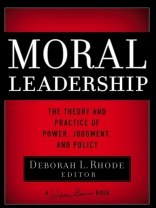Moral Leadership brings together in one comprehensive volumeessays from leading scholars in law, leadership, psychology, political science, and ethics to provide practical, theoreticalpolicy guidance. The authors explore key questions about moralleadership such as:
* How do leaders form, sustain, and transmit moralcommitments?
* Under what conditions are those processes most effective?
* What is the impact of ethics officers, codes, trainingprograms, and similar initiatives?
* How do standards and practices vary across context andculture?
* What can we do at the individual, organizational, and societallevel to foster moral leadership?
Throughout the book, the contributors identify what people know, and only think they know, about the role of ethics in keydecision-making positions. The essays focus on issues such as thedefinition and importance of moral leadership and the factors thatinfluence its exercise, along with practical strategies forpromoting ethical behavior. Moral Leadership addresses thedynamics of moral leadership, with particular emphasis on majorobstacles that stand in its way: impaired judgment, self-interest, and power. Finally, the book explores moral leadership in a varietyof contexts?business and the professions, nonprofit organizations, and the international arena.
Inhoudsopgave
Introduction: Where Is the Leadership in Moral Leadership? (Deborah L. Rhode).
Part One: Ethical Judgment.
1. Making Sense of Moral Meltdowns (David Luban).
2. Three Practical Challenges of Moral Leadership (Joshua Margolis, Andrew Molinsky).
3. Ethical Judgment and Moral Leadership: Three Barriers (David Messick).
4. Morals for Public Officials (Russell Hardin).
Part Two: The Psychology of Power.
5. The Psychology of Power: To the Person? To the Situation? Tothe System? (Philip G. Zimbardo).
6. Taming Power (David G. Winter).
7. Power and Moral Leadership (Dacher Keltner, Carrie A.Langner, Maria Logli Allison).
Part Three: Self-Sacrifice and Self-Interest.
8. Orchestrating Prosocial Motives (C. Daniel Batson).
9. Self-Sacrifice and Self-Interest: Do Ethical Values Shape Behavior in Organizational Settings? (Tom R. Tyler).
Part Four: Serving the Public Through the Public Sector:Accountability of Nonprofit Organizations.
10. Strategic Philanthropy and Its Malcontents (Paul Brest).
11. Ethics and Philanthropy (Bruce Sievers).
Part Five: Moral Leadership: Perspectives and Implications.
12. Exercising Moral Courage: A Developmental Agenda (Linda A.Hill).
13. Perspectives on Global Moral Leadership (Kirk O.Hanson).
Notes.
Acknowledgments.
About the Authors.
Index.
Over de auteur
Deborah L. Rhode is the Ernest W. Mc Farland Professor of Law and director of the Stanford Center on Ethics. She is the former director of the Keck Center on Legal Ethics and the Legal Profession at Stanford University School of Law, the former chair of the American Bar Association’s Commission on Women in the Profession, and the former president of the Association of American Law Schools.












